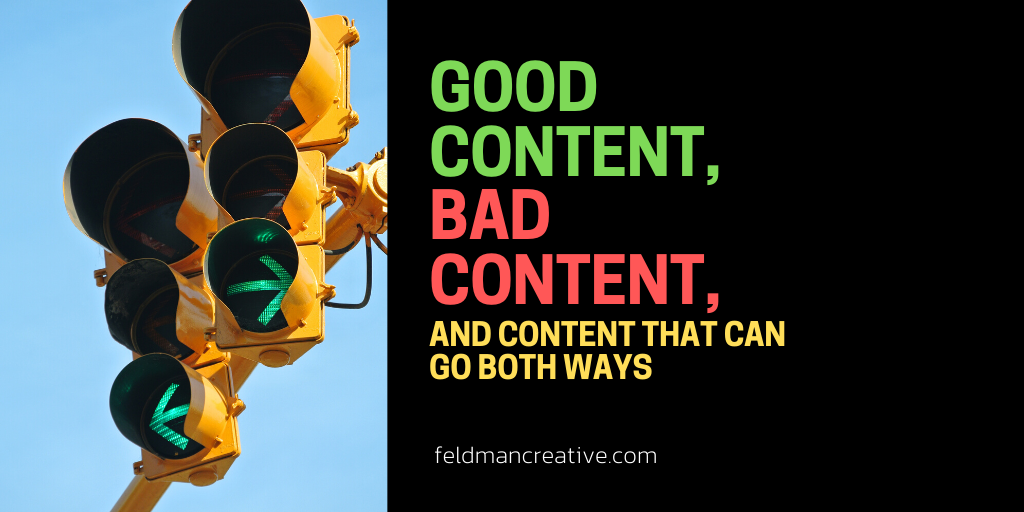“What Is The Future For Content Marketing? 9 Experts Weigh In
This article, by Arnie Kuenn of Vertical Measures, was published by MarketingLand. It’ll serve you well to check out what these experts have to say.
With 27,000 pieces of content being shared each day, it’s obvious that content marketing has become a mainstream strategy for both B2B and B2C businesses. It’s safe to say that no matter the industry you work in, most (if not all) of your competitors are utilizing content marketing strategies to some degree.
As a result, it is imperative to stay ahead of the curve when it comes to upcoming content marketing trends. But what is the future for content marketing? I’ve asked nine top content marketing industry experts for their predictions:
1. Scott Abel

Scott Abel, The Content Wrangler, is an internationally recognized content management strategist who helps global organizations improve the way they author, maintain, and deliver information.
The future of content marketing is personalization. Without personalization, we’re just spraying content around the Web and hoping it’ll stick to someone — anyone, actually.
Spray-and-pray marketing tactics are so 1952 and need to be annihilated. The future of content marketing relies on laser-focusing the message on the individual — not some fictional persona. Personalization is about delivering the right content (relevant) to the individuals who need it (and not those who don’t), at the right time (when they want or need it), in the language they prefer (their own), on the device of their choosing (not the one we imagine them using).
The future of content marketing is exactly as it has been since the beginning of time, how it is today, and how it always will be.
2. Margot Bloomstein

Margot Bloomstein is the principal of Appropriate, Inc., a brand and content strategy consultancy based in Boston, and the author of Content Strategy at Work.
The future of content marketing is something sorely needed in its present: sustainability. Rather than focusing on the hot new tool or channel, smart and ethical marketers will focus on producing less content, but of higher quality and fluidity to cross channels. That’s the goal of adaptive content in the context of responsive design — and that’s the future of smart, sustainable content strategy and content marketing.
3. Bernie Borges

Bernie Borges is CEO of Find and Convert, as well as a social business evangelist, blogger and host of the new digital TV show, Social Business Engine.
Content marketing is mainstream, but there is a lot of noise. Marketers are faced with the challenge of getting their content noticed as they work to produce measurable impact on their brand.
The future of content marketing is not to go it alone. Andrew Davis calls this “Brandscaping.” Marketers who collaborate with one or more brands to deliver a relevant content experience get noticed and get engaged with.
There are many forms of Brandscaping. One form that is effective and gaining in popularity is sponsored content. Any brand can Brandscape with LinkedIn or Facebook by sponsoring a post. A brand can sponsor a webinar with an industry association such as American Marketing Association or with an influencer.
If you’re thinking that the lines are blurring between advertising and content marketing, you’re right — they are. The key to sponsored content is to leverage the reach and trust of another brand, then deliver a compelling content experience together.
4. Heidi Cohen

Heidi Cohen is an actionable marketing expert in digital, social media and content marketing.
The future of content marketing will continue to evolve, becoming more targeted based on the convergence of social media, content and mobile. In the process, like other mature forms of marketing, marketers will align their content efforts with their business goals and incorporate sales and profit-oriented metrics to achieve those objectives. Here are three implications of these changes:
- Segmentation. Marketers will focus their content efforts around specific target segments. This requires the creation of well-formed marketing personas and social media buyer personas.
- Context. Due to the evolution and use of connected devices, the location and time of day that prospects, influencers, customers, and/or fans connect will determine content type and form. As a result, marketers need to provide content that responds to information needs throughout the buying cycle and rendered across an array of devices and sizes.
- Testing. As content marketing matures, improved results will come smaller increments based on testing different presentations. This will require the use of A/B or multivariate testing. Which Test Won and Marketing Experiments are great test resources.
5. Barry Feldman

Barry Feldman owns and operates Feldman Creative, specialists in creating effective online marketing programs.
In response to the online content noisefest, the content consumer is growing increasingly skeptical and careful. Translation for content marketers:
Get trusted or get busted.
The idea of brands becoming media sources has been largely embraced. The next step — and the challenge for every content marketer — is to earn the trust of the consumer. I believe we’ll see the fascination with popularity decline and be replaced by a commitment to forging trusted relationships.
I see the trusted relationship living and breathing in more intimate settings: groups, subscriptions, events, members-only apps, etc. The marketer won’t benefit strictly from bigger numbers, but from greater engagement, loyalty and brand advocacy.
It’s impossible not to notice Google moving more and more to a ranking system based on social media signals. That’s because they know what users really seek is trustworthy sources.
6. Rand Fishkin

Rand Fishkin is the CEO of Moz, a search engine and social optimization software with tools and tutorials that enable businesses of all sizes to increase traffic to their sites.
Content marketing is being embraced at such a rapid pace that I believe the future will be primarily about standing out from the crowd. Currently, it’s not a terribly hard task to provide a greater signal:noise ratio than most by producing relatively “high quality” content. However, the bar for what’s good and what works today will likely be below the minimum barrier to entry a few years from now. With rapid adoption comes overwhelming competition.
My advice to marketers is to be ahead of this curve by over-investing in “big” content and not getting too sidetracked by the small amount of value created by producing multiple, less valuable pieces. Moz’s own Dr. Pete wrote a great piece on why “big content” is worth the effort, and I believe that will be the future of content marketing overall.
7. Robert Rose

Robert Rose currently serves as the Chief Strategist for the Content Marketing Institute and is also a Senior Contributing Analyst for the Digital Clarity Group.
In the short term (the next 3 to 5 years) the future of content marketing is in the ability for businesses to build an organization that enables constant and agile transformation and the ability to continually create differentiated content experiences for their consumers. Simultaneously, content filtering through social networks and algorithmic optimization of content delivery will become much more prevalent for most consumers and businesses. These two trends will require a fundamental restructuring of the way most businesses (and not just the marketing department within them) operate.
In the long term (the next 5-10 years) as the lines between paid, earned and owned media blur substantially, most companies will turn to content and physical experiences as their differentiated ability, rather than product development or scale. Certainly product innovation will remain an early point of competitiveness, but the decay time for that will shorten substantially. Successful businesses will center their differentiation on their ability to compete for consumer loyalty using content strategies to power it. And at that point what used to be called “content marketing” may just be called “marketing.”
8. Marcus Sheridan

Marcus Sheridan is the founder of The Sales Lion, a premier inbound and content marketing company.
The future of content marketing is exactly as it has been since the beginning of time, how it is today, and how it always will be.
Content marketing, if we truly break it down, is built upon the following pillars:
- Great Listening
- Powerful Communication
- Skilled Teaching
(Add to that a style that’s transparent and honest.)
The businesses that did these things 100 years ago were generally the most successful with their “marketing.” The businesses that are doing this today are the ones we read about in content marketing books and case studies. And the businesses that are the best at doing the above in the future will continue to be the leaders of their realm.
My point in saying this is very simple: The platforms by which we deliver “content marketing” (websites, social media, etc.) will likely change with time, but the principles will remain the same.
The moment a company understands the difference between eternal principles and temporary platforms, their marketing and brand is then built to last.
9. Dave Snyder

Dave Snyder is the CEO of Copypress, a content lifecycle company.
I really feel the future of content marketing is native advertising, where brands become patrons for creatives that truly understand how to engage audiences.
SEOs have approached content marketing as a solution for linkbuilding, but it leaves a ton of value on the table. Content, if done correctly by moving people into the buying cycle, can yield traffic that converts, PR, branding, etc. Yes it can produce links, but if done correctly it can do much more.
Content marketing with a singular platform focus (Google, Facebook, etc.) is why so many “content marketers” are failing to create content that resonates with audiences.
What are your thoughts on the future of content marketing? Is there a content marketing expert whose opinions you value? Let’s discuss these topics here.







Comments
Jay Acunzo
I think Rand and Barry are spot on – First, differentiation is already getting REALLY hard in certain niches (for example with HubSpot when we write ebooks, they’re “worth” less today because you can trip over 300 free marketing ebooks now. Our competitors, consultants, agencies – they’re all writing in text about doing marketing in 2013 (often mentioning inbound or content, and 100% are free giveaways). In 2007? Not so. That ebook killed it.
Second, the differentiating factors that we’ve seen work (and they’re super rewarding to create if you’re on the content team) are very personalized approaches (marketing by being human? I’m in.) Or they’re “big content” (combinatory pieces – and connecting the dots and combining different, existing things is what creativity IS, so it’s a lot of fun).
Yours in content,
@Jay_zo
Barry Feldman
Good stuff Jay. Thanks for these comments and insights. Time to get personalized.